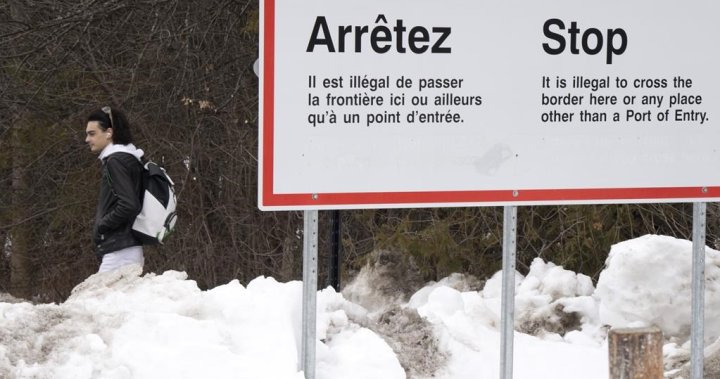
Major Canada-U.S. border rules change to take effect within hours
Global News
Canada has also agreed to welcome an additional 15,000 migrants from the Western Hemisphere over the next year as part of the agreement.
Canada and the United States have agreed to implement the Safe Third Country Agreement across the entire shared land border, in an effort to deter irregular migrant crossings at unofficial entryways like Roxham Road.
The change will take effect at midnight Saturday, according to a joint statement from Prime Minister Justin Trudeau and U.S. President Joe Biden on Friday.
Canada has also agreed to welcome an additional 15,000 migrants from the Western Hemisphere over the next year as part of the agreement.
The deal comes during Biden’s first official trip to Canada as president. The details were released shortly after he finished delivering an address to a joint session of Parliament in the House of Commons.
Since 2004, the Safe Third Country Agreement (STCA) has required that asylum seekers make their claim in the first “safe” country they reach. In practice, it has meant that border officials in Canada turn back would-be asylum seekers who show up at official checkpoints from the U.S. But they have not been required to turn back asylum seekers who cross irregularly at places such as Roxham Road in Quebec.
Last year, nearly 40,000 migrants entered Canada through Roxham Road, according to federal data. In December alone, the crossing saw 4,689 migrants enter — more than all would-be refugees who arrived in Canada in 2021.
The growing surge in migrant crossings at Roxham Road and other unofficial entry points like Emerson, Man., has strained resources in nearby communities — particularly Montreal — and sparked calls from Quebec Premier François Legault and Conservative Leader Pierre Poilievre for the federal government to close Roxham Road entirely.
Trudeau had said before Biden’s visit that the STCA should be renegotiated to address irregular crossings. But a government source told Global News Thursday that officials in both Canada and the U.S. were seeking to avoid opening up the agreement to amendments, which would require approval from a closely divided U.S. Senate.





















 Run 3 Space | Play Space Running Game
Run 3 Space | Play Space Running Game Traffic Jam 3D | Online Racing Game
Traffic Jam 3D | Online Racing Game Duck Hunt | Play Old Classic Game
Duck Hunt | Play Old Classic Game











